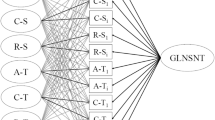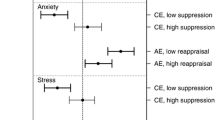Abstract
The discrepancy between college students’ performance and parents’ expectations may be related to college students’ affective distress. Further, the role that parent–college student communication reciprocity may play in the context of these discrepancies has not been examined. As a result, this study examined parent–college student expectation discrepancies and communication reciprocity as predictors of college students’ affective distress (i.e., anger, depression, and anxiety). Results of this study suggest that college student–parent expectation discrepancies, communication reciprocity, and college students’ affective distress (i.e., anger, depression, and anxiety) are interrelated significantly. Further, results from the hierarchical regressions conducted for this study suggest that college students’ perception of their communication reciprocity with their parents may be a more important predictor of college students’ depression and anxiety in the context of the expectation discrepancies examined in this study. These findings underscore the importance of teaching communication skills to college students and their parents as a means of diminishing the deleterious effects of perceiving one another inaccurately.
Similar content being viewed by others
References
Anderson, W., & Yuenger, C. (1987). Parents as a source of stress for college students. College Student Journal, 21, 317–323.
Beck, A. T. (1967). Depression: Causes and treatment. Philadelphia: University of Pennsylvania Press.
Beck, A. T., Steer, R. A., & Brown, G. K. (1996). BDI-II: Beck Depression Inventory manual (2nd ed.). San Antonio, TX: The Psychological Corporation.
Crowne, D. P., & Marlowe, D. (1960). A new scale of social desirability independent of psychopathology. Journal of Consulting Psychology, 24, 349–354. doi:10.1037/h0047358.
Cutrona, C. E., Cole, V., Colangelo, N., Assouline, S. G., & Russell, D. W. (1994). Perceived parental social support and academic achievement: An attachment theory perspective. Journal of Personality and Social Psychology, 66, 369–378. doi:10.1037/0022-3514.66.2.369.
Greenberg, M. T., Siegel, J. M., & Leitch, C. J. (1983). The nature and importance of attachment relationships to parents and peers during adolescence. Journal of Youth and Adolescence, 12, 373–386. doi:10.1007/BF02088721.
Higgins, E. T. (1987). Self-discrepancy: A theory relating self and affect. Psychological Review, 94, 319–340. doi:10.1037/0033-295X.94.3.319.
Higgins, E. T., Klein, R., & Strauman, T. (1985). Self-concept discrepancy theory: A psychological model for distinguishing among different aspects of depression and anxiety. Social Cognition, 3, 51–76.
Higgins, E. T., Strauman, T., & Klein, R. (1986). Standards and the process of self-evaluation: Multiple affects from multiple stages. In R. M. Sorrentino & E. T. Higgins (Eds.), Handbook of motivation and cognition (pp. 23–63). New York: The Guilford Press.
Kanter Agliata, A., & Renk, K. (2008). College students’ adjustment: The role of parent–college student expectation discrepancies and communication reciprocity. Journal of Youth and Adolescence, 37, 967–982. doi:10.1007/s10964-007-9200-8.
McKinney, C., & Renk, K. (2008). Multivariate models of parent-late adolescent gender dyads: The importance of parenting processes in predicting adjustment. Child Psychiatry and Human Development, 39, 147–170. doi:10.1007/s10578-007-0078-1.
Pancer, S. M., Pratt, M., Hunsberger, B., & Alisat, S. (1995, March). Great expectation: Parent–child discussion and the impact of pre-university expectations on adolescent transition to university. Paper presented at the biennial meeting of the Society for Research in Child Development, Indianapolis, IN.
Phillips, A. G., & Silvia, P. J. (2005). Self-awareness and the emotional consequences of self-discrepancies. Personality and Social Psychology Bulletin, 31, 703–713. doi:10.1177/0146167204271559.
Renk, K., McKinney, C., Klein, J., & Oliveros, A. (2006). Childhood discipline and current functioning in female college students. Journal of Adolescence, 29, 73–88. doi:10.1016/j.adolescence.2005.01.006.
Roelofs, J., Papageorgiou, C., Gerber, R. D., Huibers, M., Peeters, F., & Arntz, A. (2007). On the links between self-discrepancies, rumination, metacognitions, and symptoms of depression in undergraduates. Behaviour Research and Therapy, 45, 1295–1305. doi:10.1016/j.brat.2006.10.005.
Rubel, D. N., Eisenberg, R., & Higgins, E. T. (1994). Developmental changes in achievement evaluation: Motivational implications of self-other differences. Child Development, 65, 1095–1110. doi:10.2307/1131307.
Silva, M., Dorso, E., Azhar, A., & Renk, K. (2007–2008). The relationships among parenting styles experienced during childhood, anxiety, motivation, and academic success in college students. Journal of College Student Retention: Theory, Research, and Practice, 9(2), 149–167. doi:10.2190/CS.9.2.b.
Spielberger, C. D. (1999). STAXI-2: State-Trait Anger Expression Inventory-2 professional manual. Lutz, FL: Psychological Assessment Resources, Inc.
Spitzberg, B. H., & Hurt, H. T. (1987). The measurement of interpersonal skills in instructional contexts. Communication Education, 36, 28–45.
Strauman, T. J., & Higgins, E. T. (1987). Automatic activation of self-discrepancies and emotional syndromes: When cognitive structures influence affect. Journal of Personality and Social Psychology, 53, 1004–1014. doi:10.1037/0022-3514.53.6.1004.
Taylor, J. A. (1953). A personality scale of manifest anxiety. Journal of Abnormal and Social Psychology, 48, 285–290. doi:10.1037/h0056264.
Wang, L., & Heppner, P. P. (2002). Assessing the impact of parental expectations and psychological distress on Taiwanese college students. The Counseling Psychologist, 30, 582–608. doi:10.1177/00100002030004006.
Weidman, J. (1989). Undergraduate socialization: A conceptual approach. In J. Smart (Ed.), Higher education: Handbook of theory and research (Vol. 5, pp. 289–332). New York: Agathon.
Wintre, M. G., & Yaffe, M. (2000). First-year students’ adjustment to university life as a function of relationships with parents. Journal of Adolescent Research, 15, 9–37. doi:10.1177/0743558400151002.
Wintre, M. G., Yaffe, M., & Crowley, J. (1995). Perception of parental reciprocity scale (POPRS): Development and validation with adolescents and young adults. Social Development, 4, 129–148. doi:10.1111/j.1467-9507.1995.tb00056.x.
Wyatt, J. M., & Carlo, G. (2002). What will my parents think? Relations among adolescents’ expected parental reactions, prosocial moral reasoning, and prosocial and antisocial behaviors. Journal of Adolescent Research, 17, 646–666. doi:10.1177/074355802237468.
Youniss, J., & Smollar, J. (1985). Adolescent relations with mothers, fathers, and friends. Chicago: The University of Chicago Press.
Acknowledgments
This manuscript is based in part on the dissertation of the first author, who was supervised by the second author. Special thanks to Valerie Sims, Ph.D., Jack McGuire, Ph.D., and Mike Robinson, Ed.D., for their comments on an earlier version of this manuscript.
Author information
Authors and Affiliations
Corresponding author
Rights and permissions
About this article
Cite this article
Kanter Agliata, A., Renk, K. College Students’ Affective Distress: The Role of Expectation Discrepancies and Communication. J Child Fam Stud 18, 396–411 (2009). https://doi.org/10.1007/s10826-008-9244-8
Received:
Accepted:
Published:
Issue Date:
DOI: https://doi.org/10.1007/s10826-008-9244-8




